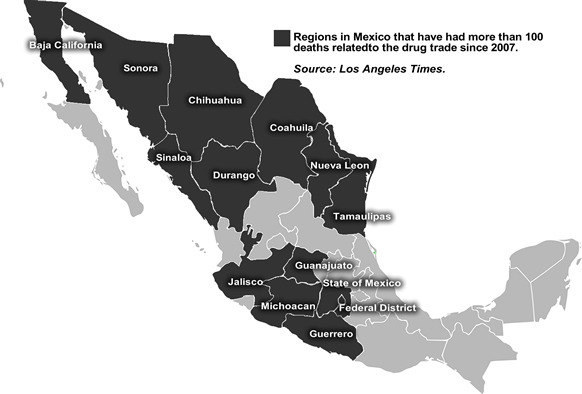By Miranda Buttram and Josh Young Jr. Posted January 12, 2011
Interview with Mr. Jonathan Gibson
How have you seen the activities in Mexico affecting the students you work with?
“There are several different impacts; some students hardly even know what is going on. When they go to Mexico it’s for vacation and they don’t worry about it or think about it. But for most of them, they are actually pretty concerned. It’s much more dangerous to travel in Mexico in most places, not all, and several of the students here have ranged from the kind of scared for their parents who had to go and wouldn’t take them because of the fear.
We had some students for immigration purposes who need to leave sometime soon, leave the United States and go back to Mexico, and then come back here when they get everything settled the way they are supposed to be; they’re doing the right things. They are afraid to go home.
I know of at least one case where they are fairly certain the father will be killed if they go back. Not because he was involved in drugs, just because he was here and a little more wealthy and left. There is a fair amount of fear.

On the other hand, I have also talked to some people who just got back after the Christmas vacation time period and they said that it turned out pretty good. They were afraid…they were cautious.
In Mexico, it has had such an impact on tourists and that includes Mexican people living in the US has slowed down so much that the government is taking an active hand to try to involve people; saying its ok, you can come we’ll do these things for you.
One other thing I’ve heard from several students is they are happy these problems are happening, they feel like the government is finally doing something about it and that’s why it has escalated, they want things to settle down but they want the government to actually fix things so that the corruption isn’t there, and so that it will be safer in the future.
That’s the range, kids, who hardly know anything about it, but most of them are very concerned. There is much more caution and much more fear. It also does make a difference in what part of Mexico.
I even heard throughout the holidays they would put out free food and music in different places along the highway and have a little party on your drive and we’ll take care of you here, they’re trying to get people to come it’s affected their economy.”
Has anyone come here specifically because of what’s going on?
“In the immediate recent history no. However, I know of a few in the last two years who were the precursors of what’s happening now are the reasons they left and the reasons they can’t go back or feel they can’t go back. It’s not necessarily they were involved in it, but they were feeling too close to it, or it was too threatening. Or family members were involved in it and, therefore, they had to leave and they are very quiet and don’t talk about it. They are very concerned that they have family still there so they don’t say much.
This going on isn’t new, there is just more of it.
And some are saying no we’re happy with this and it’s getting fixed and some are saying we’re ok. Where we’re traveling to is ok it’s not a problem…it’s a wide range.”
More than 30,000 people have died in drug-related violence nationwide since President Felipe Calderon launched a crackdown on the Mexican drug cartels after taking office in December of 2006. Recently a letter signed by the La Familia drug cartel was circulated, this letter stated that the gang will halt all crime activity during January to demonstrate that the cartel “is not responsible for the criminal acts federal authorities are reporting to the media” (news.yahoo.com).
President Calderon said during a broadcast, “We all know it is necessary to rid Mexico of crime, impunity, and corruption, which had been rooted in our society and our institutions. I can assure you we are on the right path and we will defeat the criminals, to ultimately build a Mexico of peace” (news.yahoo.com).
Though Calderon states that they are on the right path, the violence persists, with the blame falling to the cartel for the death of a pregnant American consulate worker, and her husband and the rising death toll of police killed during cartel fights. There were even people killed or injured during an Independence Day celebration when a grenade was thrown into the crowd, and the many deaths of those simply trying to document the rising troubles and violence (nytimes.com).
Many Mexicans have fled to the United States, trying to escape the dangers of the highly dangerous drug war. While they find safety, they also find loneliness and hardship. They miss the life they used to live, and for some of them, it is just a walk down the street away. Many of these immigrants have applied for Political Asylum, which is (according to Dictionary.com): “refuge given by one country to a citizen of another country to protect that person from arrest or persecution.” This means that they will be able to work and live
in this country, but they will never be able to go back home while the asylum is in effect. Should they choose to do so, they immediately lose their asylum and risk deportation if they return to the USA (latimes.com).
In the last year, the number of “zones” of impunity, where crime is uncontrolled, has decreased from 2,204 to 233 (nytimes.com). Proving that President Calderon is working to combat the violence and drug trafficking of the drug cartels.





